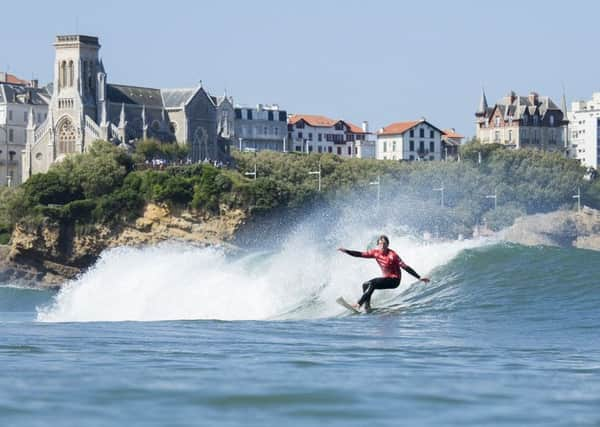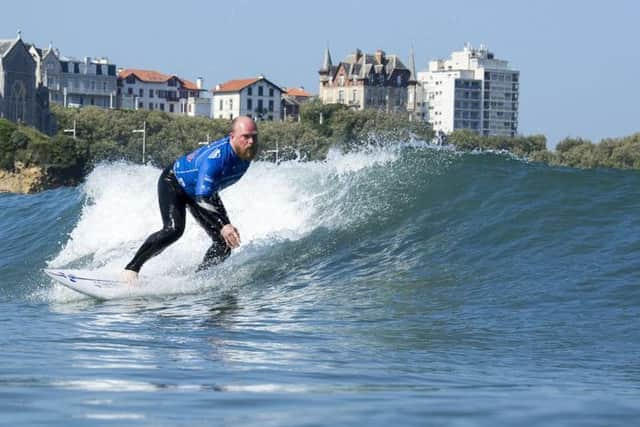Ratho wave pool could help Scottish surfing team make waves


Cameron was giving his opponents a tricky time out in the water, too. Five minutes into his 20-minute Round One heat he was sitting pretty in second place, behind Cristian Portelli of Sweden but ahead of the hotly tipped José Ferreira of Portugal, with the top two finishers advancing to Round Two and the surfer in third having to do battle in the last chance saloon of the repechage. Over the next ten minutes, however, the heat started to slip away: Ferreira posted a couple of solid scores to leapfrog into first place while Portelli drew further ahead. But then, with three minutes remaining, Cameron paddled into one of the better waves of the day and, for a few moments at least, it looked as if we might be in for a last-ditch upset.
After hopping nimbly to his feet, he flowed through a fast bottom turn, cranked a sweeping gouge off the top and then raced through a frothy inside section before bouncing off the lip one more time as the wave exploded onto the sand. The noises coming from the commentary box were encouraging – “nice first turn,” “Yeah, right off the lip with flow, with speed” – but when the judges eventually delivered their verdict the score wasn’t quite high enough to carry him through.
Advertisement
Hide AdAdvertisement
Hide AdCameron’s repechage heat the following day was held in small, inconsistent surf, and he was beaten into fourth place by Adi Gluska of Israel, Logan Landry of Canada and Jhonny Alfonso of Panama. The rest of Team Scotland didn’t fare much better: Scott Main and Chris Clarke were also eliminated at the repechage stage while Mark Boyd, after progressing convincingly from his repechage heat, was eliminated in Round Two. With both the women’s surfers, Shoana Blackadder and Jen Wood, also going out in the repechage, Team Scotland ended up ranked 38th out of 47 competing nations. Of all the nations that entered a full complement of four men and two women, only China finished with a lower points tally.


That said, from a Scottish perspective the conditions in Biarritz could hardly have been worse, particularly for the men, who at times had to compete in waves that were almost comically small. Cameron, Main, Clarke and Boyd are at their best when surfing thundering ten-foot barrels at Thurso East, so the sleepy two-foot beachbreak waves on offer in Biarritz were never going to allow them to play to their strengths. More than once, they looked like men accustomed to fighting with claymores and broadswords who had been invited to try their hand at a spot of fencing.
One of the rewards for contributing to the Crowdfunder to help cover Team Scotland’s costs in Biarritz was a film called 01847 by Thurso lensman Malcolm Anderson, and it shows what these surfers can do when the waves get serious. They may not be the best in the world at generating momentum in knee-high dribble, but when it comes to dealing with the raw power of the North Atlantic in the middle of the winter storm season, you get the feeling they could probably give most people a run for their money.
For the time being, then, Team Scotland’s success on the world stage will probably have a lot to do with where competitions are held: the bigger the waves, the better they’ll do. In the longer term, however, it’s interesting to speculate about how Wavegarden Scotland, the proposed artificial wave pool at Ratho, near Edinburgh, might affect our surfers’ chances in more modest conditions. As outlined in last week’s column, the so-called “Cove” technology the Wavegarden team is planning to install would allow waves of various shapes and sizes to be served up to order. As Boyd puts it: “A facility like [this] would give the Scottish surfing team a huge edge, helping us prepare for different conditions.”
Wavegarden Scotland submitted their planning application on Tuesday, so who knows? The 2027 Scottish champ might just come from easy-to-pronounce Ratho.